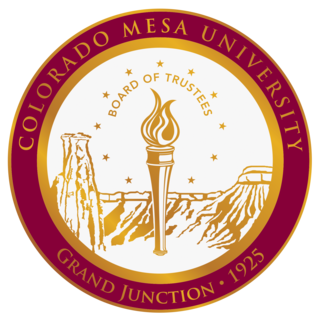
WHUS is a non-commercial educational FM college radio station. It transmits with 4,400 watts on 91.7 MHz from the main campus of the University of Connecticut in Storrs to audiences in eastern Connecticut, southern Massachusetts and western Rhode Island. WHUS operates as a campus-focused station that features members of the student body and the local community.
High school radio are radio stations located at high schools and usually operated by its students with faculty supervision. The oldest extant high school AM radio station is AM 1450 KBPS in Portland, Oregon. Portland radio station KBPS, first licensed in 1923, is the second oldest radio station overall in the city of Portland. The student body of Benson Polytechnic High School purchased the transmitter and other equipment from Stubbs Electric in Portland for $1,800. Money for the purchase of the station came from student body funds. On March 23, 1923, the student body of Benson was licensed by the federal government to operate a radio station using 200 watts of power on 834 kilocycles. The first call letters of the station were KFIF. The station made its formal debut on the air and was officially dedicated in early May 1923, between the hours of 9:30 p.m. to 10:30 p.m., on the opening night of the 5th annual Benson Tech Show. In spring of 1930, the callsign changed from KFIF to KBPS, for Benson Polytechnic High School. In 1941 KBPS stopped sharing its frequency with other stations and moved to 1450 AM on the dial where it remains today. In 1971 the FCC gave the station permission to increase daytime transmitting power to 1,000 watts. Nighttime power was 250 watts. KBPS is now licensed for 1,000 watts 24 hours a day. The KBPS studios, transmitter and 200–foot self-supporting steel tower are located at the rear of the Benson campus. AM 1450 still broadcasts 24/7/365 and the KBPS Radio Broadcasting program at Benson High School still teaches today's students about radio broadcasting and audio content creation.
WTKL is a radio station in North Dartmouth, Massachusetts. It is an owned-and-operated station of the national K-Love Contemporary Christian network, covering the South Coast of Massachusetts from a tower located on the campus of the University of Massachusetts Dartmouth.

WMFO is a freeform radio station licensed to Medford, Massachusetts. The station is owned by Tufts University and is run by students and community members. WMFO is funded by the Tufts Student Activities Fee as allocated by the TCU Senate and through community donations.
WUOT is a non-commercial, listener-supported, public radio station in Knoxville, Tennessee. It is owned by the University of Tennessee, and it airs a mix of news, classical music and jazz. It is a charter member of National Public Radio (NPR). The studios and offices are on Circle Park Drive in Knoxville.

Colorado Mesa University is a public university in Grand Junction, Colorado, United States. Originally established in 1925 as Grand Junction Junior College, the school was renamed to Mesa College in 1940. The college began offering bachelor's degrees in 1974, and in 1988, changed its name to Mesa State College to reflect its growing educational programs. In 2011, the school officially attained university status and adopted the name Colorado Mesa University.
WMRA is a public-radio formatted broadcast radio station licensed to Harrisonburg, Virginia. It is the NPR member station for the central Shenandoah Valley. Combined with its full-power repeaters and low-power translators, it serves much of west-central Virginia from Winchester to Lexington as well as the Charlottesville area. WMRA is owned and operated by James Madison University.

KWDM, "88.7 KWDM The Point," is a modern rock high school radio station serving the Des Moines, Iowa area on 88.7 FM. The radio station's studio is located at Valley High School in West Des Moines. It is owned and operated by the West Des Moines Community School District and is operated by students at Valley under the direction of a staff advisor.

KCSU-FM is Colorado State University's non-commercial, student-run, campus radio station licensed to Fort Collins, Colorado. KCSU broadcasts at 10,000 watts, reaching east to Greeley, south to Longmont, and north to the Wyoming border. KCSU a 501c3 non-profit organization affiliated with Rocky Mountain Student Media Corporation and is one of the largest college radio stations in the country. The KCSU broadcast signal reaches over 250,000 people.
WALY is an adult contemporary music formatted FM radio station in Altoona, Pennsylvania. The station is owned by Seven Mountains Media. The station has an ERP of 3,000 watts.
KRCC is a public radio station in Colorado Springs, Colorado. It is owned by Colorado College and operated by Colorado Public Radio.
WKPX is the non-commercial, educational radio station owned and operated by the Broward County Public Schools (BCPS), broadcasting at 3,000 watts and reaching all of Broward County. In mid-2020, production studios were relocated from Piper High School, where the station had operated for many years, to BECON's production facility in Davie. This move is a first step in a plan to create internship opportunities for students throughout BCPS to get training and practical experience in radio as well as television and video production.
WPRK 91.5 FM is a non-commercial college radio station located in Winter Park, Florida, United States. It is owned and operated by Rollins College. Its signal is audible in most of the Orlando metropolitan area. WPRK features programming from nearly every mainstream and non-mainstream music genre.

KGRE is a radio station broadcasting a Regional Mexican format. Licensed to Greeley, Colorado, United States, it serves the Ft. Collins-Greeley area. The station is currently owned by Greeley Broadcasting Corporation.
KCIC is a radio station broadcasting a religious radio format. Licensed to Grand Junction, Colorado, United States, it serves the Grand Junction area. The station is currently owned by Pear Park Baptist Schools.
KLFV is a radio station in Grand Junction, Colorado. The station broadcasts a contemporary Christian format from the K-Love radio network; the station and network are owned by the Educational Media Foundation.
KNAU is a radio station broadcasting a classical music and news/talk and information format. Licensed to Flagstaff, Arizona, United States, KNAU and its sister stations serve Northern Arizona. The station is currently owned by Northern Arizona University (NAU) and features programming from National Public Radio, Public Radio International, and American Public Media, among other content providers. NAU also owns KPUB, a station devoted to talk programming, and student-run low-power station KLJX-LP. KNAU's programming is heard on KNAA in Show Low and on five translators in northern Arizona, as well as online.
WVLR-FM is a station that broadcasts a classical music format. Licensed to Lyndonville, Vermont, United States, the station is owned by Vermont Public Co.

KRGS was a radio station licensed to Rifle, Colorado, United States. The station was owned by Western Slope Communications, LLC. In 2019 the Federal Communications Commission granted a construction permit to move to a new transmitter site, increase day power to 2,300 watts and increase night power to 16 watts. It expired in 2022 without being built.
WGAG-FM was a high school radio station at Oak Ridge High School in Orlando, Florida. The station operated on 89.3 MHz between 1977 and 1981.







